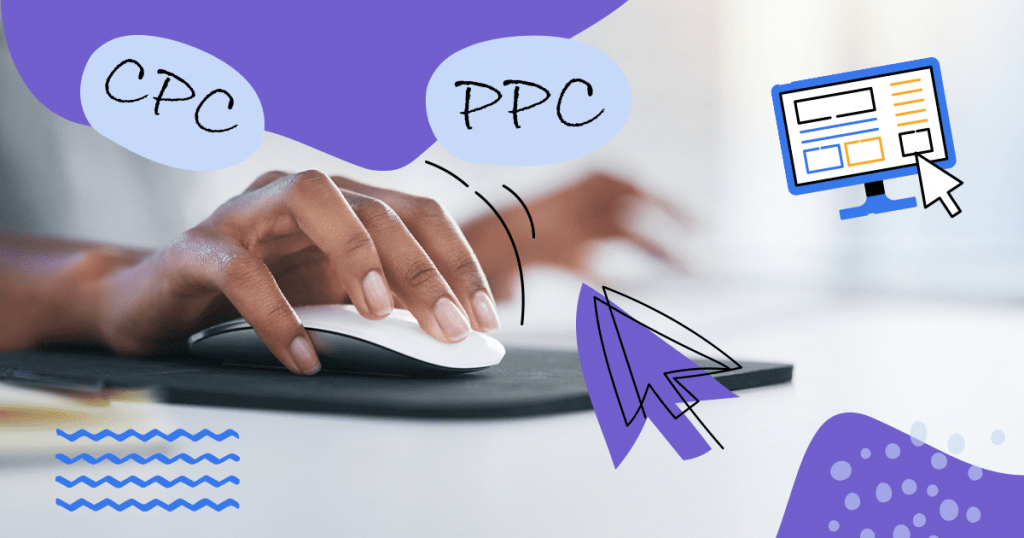Acronyms. Oh, how we don’t love them, but the online marketing industry sure does.
If you aren’t familiar with the two acronyms used in the title of this article, then you may be a little confused right now.
You may even be confused if you know the meaning of them! After all, PPC and CPC tend to be used interchangeably, leading to confusion amongst new advertisers.
Although the two are similar, they both have their differences that advertisers must be familiar with in order to succeed.
Therefore, the meaning of PPC (pay-per-click) and CPC (cost-per-click) are crucial pieces of jargon in the world of digital marketing, as they are necessary tools to growing your business.
Both pay-per-click and cost-per-click marketing can help you reach millions of different people worldwide in mere minutes.
The reach is vast, and the return on investment can be great (potentially $2 for every $1 you invest), but if you don’t know what you’re doing, you can quickly lose money.
This post is going to contrast PPC vs CPC, allowing you to move forward in the right direction with your business in terms of marketing and growth.
Here’s what you’ll learn:
- What Is PPC?
- What Is CPC?
- PPC vs CPC: What’s the Difference?
- How Does PPC Work?
- How Does CPC Work?
- Why Should You Use PPC Advertising?
- How Do You Calculate CPC?
- How Do You Measure the Performance of a PPC Campaign with CPC?
- Wrap Up: Which One Won the “PPC vs CPC” Dispute?
What Is PPC?
Pay-per-click marketing is a common form of online advertising that is used today to drive traffic from search engines and increase sales conversions.
This type of advertising model is utilized to insert ads on third-party websites, social media platforms, search engines, and the like.
With PPC marketing, you only pay when your ad is clicked on.
In addition, you can also ensure that your ads are only placed in front of people who fit your overall customer demographic, increasing your chances of a sale.
Google is considered the largest provider of PPC marketing services, as the company generates more than $134 billion in ad revenue.
This number steadily climbs year after year. For this reason, most people turn to Google Ads when they are first starting out with PPC.
You can see these ads by performing a simple Google search. They appear at the top and bottom of the search engine results page (SERPs).
What Is CPC?
Rather than being a completely different form of advertising model, CPC is actually part of PPC advertising.
Therefore, cost-per-click is a financial metric that represents the amount you pay for every click in your PPC campaign.
The CPC metric can be used for a certain keyword, or it can be applied to your entire advertising campaign.
It can also be used to measure the performance of your ad.
PPC vs CPC: What’s the Difference?
Although PPC and CPC are indeed used together in marketing campaigns, they are not one and the same.
PPC serves as a paid advertising method where advertisers pay a certain amount when their ad is clicked on, whereas CPC serves as a financial metric to measure the overall cost of each advertisement click for the campaign.

How Does PPC Work?
Like the marketing channel it is, PPC covers a multitude of different ad platforms.
The most common platform is Google Ads. Within Google Ads, there are a variety of formats, such as Search Ads, Video Ads, Shopping Ads, Gmail Ads, and more.
More often than not, businesses will start with Google Ads, since it offers the largest audience potential.
Regardless of the platform and/or ad format, the process is pretty much the same.
When a web user performs a Google search, an auction begins to determine the ads that will appear in the SERPs and how much each click will cost for each of the ads displayed.
There are many factors that influence the auction process.
➤ One factor is the maximum CPC that is set forth by the advertising business in their Google Ads account.
This is essentially the maximum amount of money that they are willing to pay for each click per keyword/group of ads.
➤ Another factor is the Quality Score, which is a special metric that combines the anticipated click-through rate (CTR) of the ad, the relevancy of the advertisement to the search query, and the experience of the web page that the advertisement is ultimately sending traffic to.
How Does CPC Work?
Once you have your pay-per-click marketing campaign up and running, you will use cost-per-click to measure and maintain the efficiency and relevancy of your campaign’s ads.
After all, you don’t want to continue to run ads that aren’t proving to be effective.
The more clicks that come in for your ad, the cost-per-click will begin to decrease. This is ultimately a sign that your ad campaign is successful.
There are several different factors that determine the cost per click of your advertisements.
One factor that plays a significant role in determining the amount you will pay for each click is the rank of the advertisement.
➤ In addition to the rank of the advertisement, competitiveness of the keyword, search volume for the keyword, and click-through rate are also factors that will be taken into consideration.
Regardless of what type of business you operate or what industry you are in, these factors are used across the board among all platforms.
However, each platform will have its own individual standards it uses as well. This means that they will have different CPC prices for keywords.
So, while you may pay $0.50 for each click on Google, you may pay double that on Facebook. In addition, the more desirable a keyword is, the higher the cost-per-click will be for that keyword.
Why Should You Use PPC Advertising?
You may be curious whether pay-per-click advertising is right for your business.
Like any kind of marketing, PPC comes with its advantages and disadvantages. Ideally, PPC should only be a part of a much larger digital marketing campaign, allowing you to use it to its full potential.
PPC advertising can offer you immediate results.
Once your ads have been approved, they will immediately begin to reach your audience, which is highly targeted, since you get to be specific about who your targeted demographic is.
PPC marketing is also easy to track and offers considerable exposure due to the paid ads being prominently displayed for your audience to see.
As you are using PPC advertising, it is important to keep in mind that it can be costly in the long term since you’re paying for each and every click.
In addition, your success will rely on ad spending, so you will want to ensure that you are using PPC to build an asset like an e-mail marketing list.
How Do You Calculate CPC?
One of the biggest questions that you are likely to have now that you know the difference between PPC and CPC is how cost-per-click can be calculated.
The good news is that it is relatively easy to calculate CPC:
- Determine the cost of overall advertising.
- Determine the number of clicks that were gained.
- Divide the advertising cost by the number of clicks.
- The result is your CPC, or cost-per-click.
For instance, if you spent $600 on advertising and gained 750 clicks, then you would divide $600 by 750. The result is $0.80, which is your cost-per-click.
How Do You Measure the Performance of a PPC Campaign with CPC?
The CPC is a vital metric in your PPC campaign because it allows you to measure its overall performance.
Due to the fact that the return on investment of your digital marketing campaigns is ultimately determined by the amount you are paying per click and the quality of traffic being generated from those clicks, the cost per click must be considered in terms of cost and value.
By calculating the CPC cost, you can learn how your PPC campaign is performing and then set your goals for moving forward accordingly.
The average CPC is determined by dividing the total PPC campaign cost by the total number of clicks generated.
If you have a high CPC and are generating low leads and conversions, something is wrong.
Your strategy needs to be reevaluated or your entire marketing budget will go down the drain without a positive ROI.
Take into consideration your strategy of keyword bidding and the quality score of your ad.
Wrap Up: Which One Won the “PPC vs CPC” Dispute?
There is no winner. PPC and CPC both play an important role in your digital marketing campaign.
You essentially can’t have one without the other. PPC is the approach that you are taking to your marketing campaign, while CPC is the performance metric.
It’s really that simple! The two concepts are very distinct, but they are intricately connected.
If you have been struggling with your PPC advertising campaigns, it may be in the content.
Content plays a significant role in the overall success of your campaigns. If you would like to increase your ad performance with high-quality content, request a free demo today!








